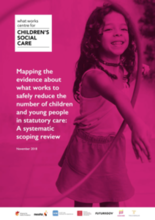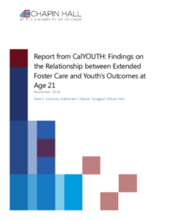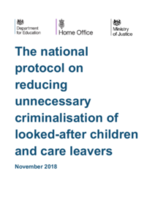Displaying 1071 - 1080 of 2221
This study is a scoping review to explore what research evidence exists about what works in safely reducing the number of children and young people in care.
The aim of this study was to improve the mean time to initial foster care evaluation (TIE) from 32 to <7 days within 12 months for children in FC in Durham County, North Carolina.
The present report builds on prior research by examining outcomes from the third interview wave of the California Youth Transitions to Adulthood Study (CalYOUTH), which took place when study participants were 21 years old or older.
This guidance from the UK's Department for Education presents a framework to help social care and criminal justice agencies keep looked-after children out of the criminal justice system.
The question in the title is addressed by exploring the challenges inherent in providing care for children who are unable to live with their birth families.
This study tested the hypotheses that inverse relationships would exist between connectedness in three social domains (i.e., caregiver, peers, and school) and suicidal ideation over time.
This paper is based on findings from an Irish study of permanence and stability outcomes for children in long-term care which involved biographical narrative interviews with 27 children, young people, parents and foster carers.
In the current study, the authors examined whether children with Child Protective Services (CPS) involvement who were in foster care had more advanced receptive vocabulary than children with CPS involvement who resided with their birth parents.
This study examined whether children with Child Protective Services (CPS) involvement who were in foster care had more advanced receptive vocabulary than children with CPS involvement who resided with their birth parents.
In the present study, the authors examined the effects of two types of initial short-term placements: emergency placements (lasting 1 to 5 days) and provisional placements (lasting 6 to 60 days) on the risks of re-entry into care in the four years following reunification.



